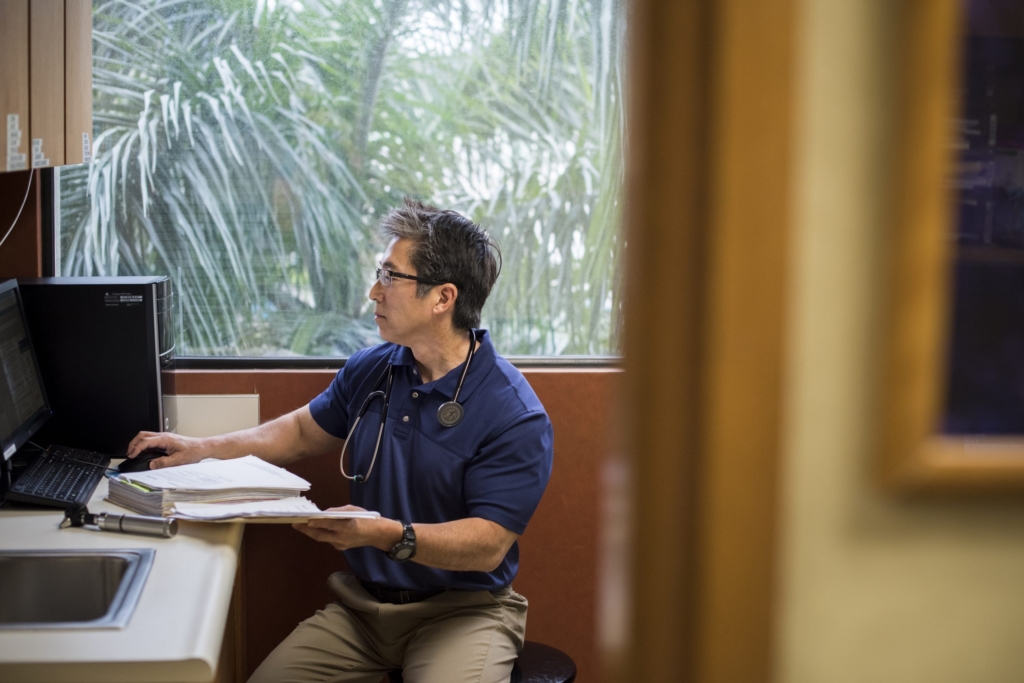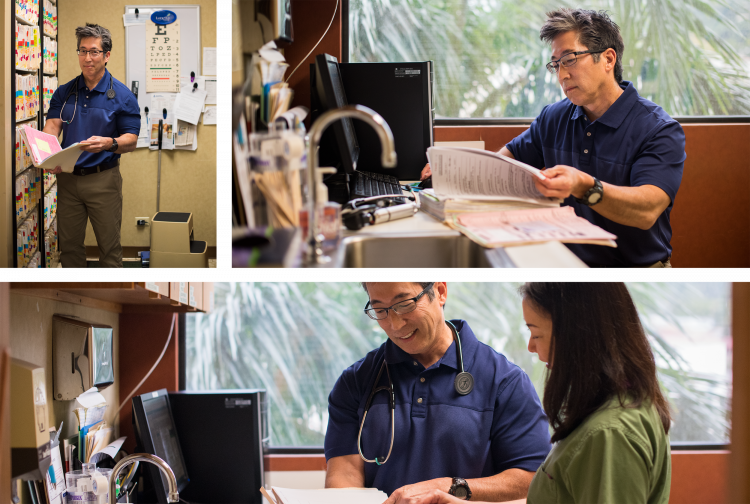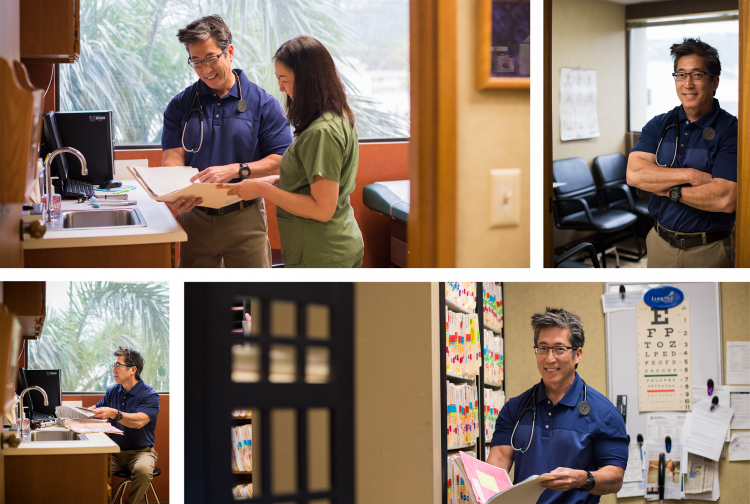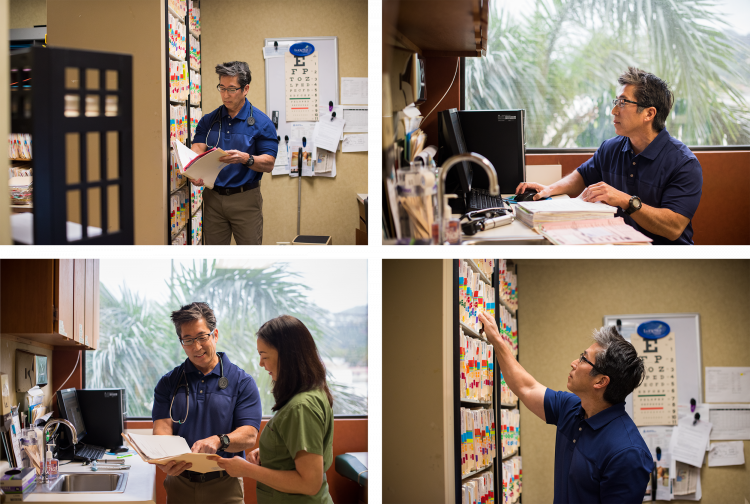Meet the Community Physician Committed to Pursuing Balance Between Family and Medicine

Between the noble purpose and sizable pay, it’s easy to assume that doctors have it made. But as medicine and business collide, the profession is changing. Thousands of physicians now report increasing levels of burnout and stress—the result of longer work hours, “feeling like a cog in the wheel,” and increasing bureaucratic tasks that infringe upon patient time.
Dr. Owen Nishikawa isn’t one of those physicians. While he knows that work-life balance may be a pipe dream for many of his physician peers who are employed at big health systems, he owns his own practice in Honolulu, Hawaii. He doesn’t complain about the hours, the autonomy, and the quality of his patient relationships. In fact, they’re what drew him to a career in family medicine.
Today, he’s skipping out of the office early so he can cheer on his youngest son from the bleachers at a high school wrestling match. With three boys, there’s never a dull moment. A wrestling match today, another step toward his Eagle Scout ranking tomorrow. Exams, romance, and peer pressure—with each new trial his boys are becoming men.
For Dr. Nishikawa, there’s nothing quite like watching that process in real time, so he’s there to show support at every milestone. It takes a lot of time and effort to be present, but he’s driven by the core values of quality family time and quality patient time.
Thanks to independent private practice, he’s found a way to ensure he gets plenty of both.
Following the Path or Forging Your Own
Like the island lifestyle that surrounds him, Dr. Nishikawa is calm, centered, and all about balance. As a physician, he’s responsible for the health and well-being of dozens of members of the Honolulu community. As a father, he wants to be there for his three sons. Neither responsibility is taken lightly–his “family” core value extends to his immediate family and to anyone who walks through the front doors of his aptly-named family practice.
However, Dr. Nishikawa sets clear boundaries between patient time and family time that start with the hours he spends at the office. Except for emergencies, his practice doors open at 8:30am and close at 4:00pm during the week (not including Wednesday, when they close at noon). The big idea?
Being the physician his patients deserve doesn’t mean he can’t be the father his boys need.
Likewise, being a good father doesn’t mean his patients miss out on quality care. During a time when many employed physicians are feeling increasing levels of depersonalization and isolation from their patients, Dr. Nishikawa makes human connection a cornerstone of his practice’s business model. The bottom line is important, but he prefers to measure professional success in small wins, like whether he can convince a patient to make lifestyle changes that bring down their cholesterol or weight over a series of visits.
“I believe in gentle persuasion,” he explains. It’s a tactic that he’s honed through years of experimentation, and one that he uses across the different buckets of his life. As a father, gentle persuasion is all about pushing his sons to be their best, but not pushing so hard that he pushes them away. As a physician, his success hinges upon whether his patients feel that his advice is coming from a place of understanding, rather than a place of judgement. He’s found that gentle persuasion is the surest way to build that trust.
“In my practice I always emphasize that it’s not just me directing my patients on how to get healthier. It’s a team effort. It’s the patient and the doctor working together,” he says.
This team-based approach to wellness is a far cry from the methods that many employed physicians are instructed to use. Doctors at health systems are often bound by protocols and formularies that corporatize interactions with patients and restrict use of the intuition they build over years of boots-on-the-ground practice.
Such structure may boost bottom line benefits, but it brings consequences elsewhere: In a Medscape survey, many physicians reported lack of respect from administration and lack of autonomy as drivers of burnout, too. That burnout, in turn, brings its own consequences. Recent evidence suggests that burned out physicians are at increased risk for cardiovascular disease, shorter life spans, problematic alcohol use, broken relationships, depression, and suicide.
For Dr. Nishikawa, trading his own well-being for dubious status quo medical care just isn’t worth it.
“I think we get caught up in all these checkboxes and we forget that in medicine, we’re talking to people. We forget that we’re trying to help people and we forget that we’re people too. We’re not just computers and we shouldn’t just be doing things because insurance companies or anyone else wants us to,” he says.
Approaching medicine with a profit-first mindset would make it nearly impossible for Dr. Nishikawa to achieve work-life balance. It would prevent him from enjoying the relationships he builds with patients. It would prevent him from watching his son from the stands at a high school wrestling match.
“If I’m going to work, I’m going to work hard. But at the same time, I’m not going to work all night,” he explains. “I’m going to get home and balance my work with quality time with my family.”
Personal and Professional Values

When Dr. Nishikawa ponders his own childhood from the present, where he’s a father of three, he can see a few things his parents had donea little differently. As a kid, they allowed him to drop out of Cub Scouts. When he looked up into the bleachers during his own sporting events, they weren’t always there. Family dinners with mom and dad were a rare occurrence.
“That was their parenting style and I understand that,” Nishikawa says. “But because I felt there was something lacking in my relationship with my parents, I didn’t want the same thing. I didn’t want to perpetuate that with my kids.”
He hasn’t.
Soon, Dr. Nishikawa’s youngest son will earn his Eagle Scout ranking. As a long-time assistant scoutmaster, Dr. Nishikawa will be there to congratulate him. Not long after, he will graduate high school and prepare for his freshman year of college. Of course, Dr. Nishikawa will be in the stands, cheering him on as he accepts his diploma.
Because of the way he operates his private practice, Dr. Nishikawa will never have to look back on life and wish he spent more time with his kids. His sons will never have to reminisce on his formative years and think about a time when his father was too busy at work to make time to show that he cared.
And Dr. Nishikawa’s patients? They’ll never have to suffer the frustration of a rushed 7-minute appointment or fear the increased safety risks that come with being treated by a burned out physician. Under the increasing weight of administrative oversight, too many doctors are forced to sacrifice patient time and family time to satisfy a growing list of demands. But Dr. Nishikawa isn’t one of those doctors.
He knows that life, like medicine, is all about balance.







